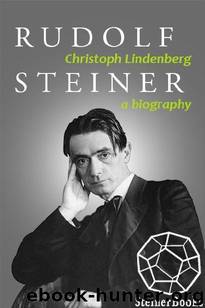Rudolf Steiner: A Biography by Christoph Lindenberg

Author:Christoph Lindenberg [Lindenberg, Christoph]
Language: eng
Format: epub
ISBN: 9781621480273
Publisher: Steinerbooks
Published: 2012-11-01T04:30:00+00:00
CHAPTER 33
BUILDING
The twentieth century bore witness to a number of connections between philosophy and architecture. There were thinkers who strove to build and give form to things, and there were architects who wrestled with philosophical principles. Ludwig Wittgenstein, one of the most influential Western philosophers, was also an architect. In 1926, he designed the Stonborough Residence in Vienna. He worked through each detail of the house. On the other hand, the architects of the Bauhaus school as well as Le Corbusier developed their own philosophies. The desire to transcend the merely conventional in architecture in order to achieve a new quality of style is symptomatic in these strivings. In the case of Wittgenstein and the Bauhaus architects, this new style was inspired by natural science and technology. Functionality, faithfulness to the materials, and clarity were their mottos.
Rudolf Steiner's architectural impulse must be seen as a remarkable example of this struggle to bring forth a new style. He not only designed the first Goetheanum in a completely new, freely formed style—and then just ten years later the second Goetheanum in very different style—he also designed a series of houses, an art studio, a boiler house and a transformer house, each with its own original look. Taken together, these buildings bear witness to an extraordinary architectural imagination. Steiner's architectural work, which began in 1913, had a certain history that we will examine briefly. First some thoughts concerning his general intentions.
When Rudolf Steiner returned to Berlin after the Munich congress in 1907, he prepared a short report for the members detailing the intention of this gathering. In this report we find the following remarks: “Theosophy can also be built: it can be built architecturally, in education and in the social realm. The Rosicrucian principle is to bring spirit into the world, to do productive work for the soul” (96).
When Steiner spoke here of building, he meant any kind of practical work, work for others, or socially productive work. “Building” is thus a metaphor for work that serves to transform the world. Steiner was not primarily interested in putting up buildings, but in bringing inner work to outer expression. In his talk about the Munich congress, he also said, “It strove to show something about our theosophical work that I have repeatedly emphasized—that theosophy should not only be a matter of personal pondering or a living-into-oneself. Theosophy should take hold of practical life, should be a question of Building, a question of working one's way into all the various aspects of practical life” (96).
“Spiritual Science should not and does not intend to bring forth couch-potatoes or strangers to life; it will bring forth people of action, who are able to step forth into the world” (96).
Steiner did not simply have normal business in mind when he spoke these words; he was envisioning an activity of cultural reform and transformation. And all culture needs form, style—something that in this day and age of formlessness and the lack of style is sometimes difficult to understand. Steiner had articulated this idea relatively early, in 1905, in a letter to Marie von Sivers.
Download
This site does not store any files on its server. We only index and link to content provided by other sites. Please contact the content providers to delete copyright contents if any and email us, we'll remove relevant links or contents immediately.
Hit Refresh by Satya Nadella(9117)
When Breath Becomes Air by Paul Kalanithi(8422)
The Girl Without a Voice by Casey Watson(7879)
A Court of Wings and Ruin by Sarah J. Maas(7809)
Do No Harm Stories of Life, Death and Brain Surgery by Henry Marsh(6931)
Shoe Dog by Phil Knight(5255)
The Rules Do Not Apply by Ariel Levy(4953)
A Higher Loyalty: Truth, Lies, and Leadership by James Comey(4946)
Hunger by Roxane Gay(4920)
Tuesdays with Morrie by Mitch Albom(4765)
Everything Happens for a Reason by Kate Bowler(4729)
The Immortal Life of Henrietta Lacks by Rebecca Skloot(4571)
Millionaire: The Philanderer, Gambler, and Duelist Who Invented Modern Finance by Janet Gleeson(4460)
How to Change Your Mind by Michael Pollan(4353)
All Creatures Great and Small by James Herriot(4304)
The Money Culture by Michael Lewis(4188)
Man and His Symbols by Carl Gustav Jung(4120)
Elon Musk by Ashlee Vance(4118)
Tokyo Vice: An American Reporter on the Police Beat in Japan by Jake Adelstein(3973)
